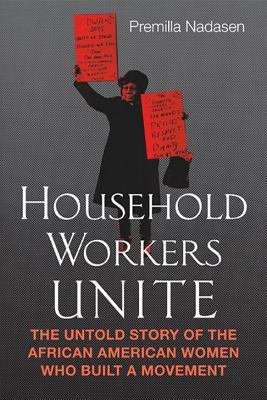 ISBN: 0807014508
ISBN: 0807014508Published: August 25th, 2015
Publisher: Beacon Press
Read from January 11th to 16th, 2016
Synopsis from Goodreads:
Premilla Nadasen recounts in this powerful book a little-known history of organizing among African American household workers. She uses the stories of a handful of women to illuminate the broader politics of labor, organizing, race, and gender in late 20th-century America. At the crossroads of the emerging civil rights movement, a deindustrializing economy, a burgeoning women's movement, and increasing immigration, household worker activists, who were excluded from both labor rights and mainstream labor organizing, developed distinctive strategies for political mobilization and social change. We learn about their complicated relationship with their employers, who were a source of much of their anguish, but, also, potentially important allies. And equally important they articulated a profound challenge to unequal state policy. Household Workers Unite offers a window into this occupation from a perspective that is rarely seen. At a moment when the labor movement is in decline; as capital increasingly treats workers as interchangeable or indispensible; as the number of manufacturing jobs continues to dwindle and the number of service sector jobs expands; as workers in industrialized countries find themselves in an precarious situation and struggle hard to make ends meet without state support or protection--the lessons of domestic worker organizing recounted here might prove to be more important than just a correction of the historical record. The women in this book, as Nadasen demonstrates, were innovative labor organizers. As a history of poor women workers, it shatters countless myths and assumptions about the labor movement and proposes a very different vision.
Review:
Before reading this book, I had a limited knowledge of current issues surrounding domestic workers. I also also aware of the stereotypes of domestic work and workers in both the past and present in the United States, as I'm sure most Americans are. I had essentially no knowledge about the household workers movement described in this book, which is remarkable considering how many years the movement stretches over.
The book is a detailed account of so much work done by black women to fight for household worker's rights. Because I knew so little about it beforehand, I was fascinated by the information in the book. There was exploration of the role both race and gender played in the struggle and how the view of housework as being separate from the work world leads to household workers' rights being overlooked in comparison to the rights of other workers.
I'm glad this book exists because I don't think this is a topic written about as often as it should be, and it deals with an issue that includes the intersectionality of race and gender. If you're at all interested in this topic, I would recommend this book.
I received this book through Goodreads First Reads for an honest review.

Cool stuff you have got and you keep update all of us. sub zero error codes
ReplyDelete